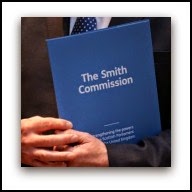Smith – A Constitutional fudge
and the worst of both worlds?
Gordon MacIntyre-Kemp (30/11/2014)
Anyone passing through the Glasgow underground, or any train station, or even looking at the back end of a bus, will know it’s pantomime season. My favourite one just launched yesterday, written by a new scriptwriter called Lord Smith, it is called “Devolution to never never land”. The grand old dames are played by the London centric unionist press, the bad guys are the Unionist Westminster MPs who will attempt to derail any real devolution, and the audience who might soon regret buying a ticket (by voting No) are the people of Scotland. It’s got a complicated plot but it all revolves around the unionists shouting “it’s devo max, and effective home rule, everything we promised” to which the audience shout “Oh no it’s not”.
Vow max or pantomime politics taken to the max?
First we have the Daily Record, the original publisher of the VOW, desperate to avoid a circulation drop to match the Scottish Labour parties poll ratings, saying the Smith Commission report was the vow delivered. We also have Mr No Tuition Fees himself, deputy PM Nick Clegg, getting so excited about the Smith Commission that he seems to have lost the ability to speak in normal English and just uses a dialect called spin, when he said “We’ve not only delivered on that vow, on the timetable that we said, we’ve over-delivered on it – it’s ‘Vow Max’, if you like.”
Vow max? That really is pantomime politics taken to the max. You would expect me or the SNP / SSP and Greens to be fairly disappointed with some (if not all) of the Smith Commission suggestions, but its worthwhile taking a moment to figure out who is shouting “Oh no it’s not” the loudest.
Read full article
_______________
















.jpg)















